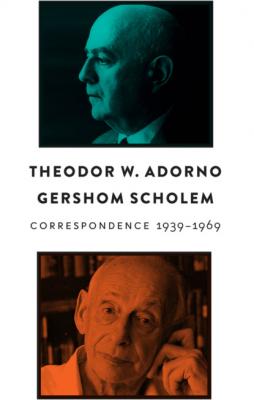Correspondence, 1939 - 1969. Gershom Scholem
Читать онлайн.| Название | Correspondence, 1939 - 1969 |
|---|---|
| Автор произведения | Gershom Scholem |
| Жанр | Философия |
| Серия | |
| Издательство | Философия |
| Год выпуска | 0 |
| isbn | 9781509510498 |
432 393
433 394
434 395
435 396
436 397
437 398
438 399
439 400
440 401
441 402
442 403
443 404
444 405
445 406
446 407
447 408
448 409
449 410
450 411
451 412
452 413
453 414
454 415
455 416
456 417
457 418
458 419
459 420
460 421
Correspondence
1939–1969
Theodor W. Adorno and Gershom Scholem
Edited and with an Introduction by Asaf Angermann
Translated by Paula Schwebel and Sebastian Truskolaski
polity
Originally published in German as “Der Liebe Gott wohnt im Detail” Theodor W. Adorno / Gershom Scholem Briefwechsel 1939–1969, herausgegeben von Asaf Angermann © Suhrkamp Verlag, Berlin, 2015
This English edition © Polity Press, 2021
The translation of this work was supported by a grant from the Goethe-Institut.
Polity Press
65 Bridge Street
Cambridge CB2 1UR, UK
Polity Press
101 Station Landing
Suite 300
Medford, MA 02155, USA
All rights reserved. Except for the quotation of short passages for the purpose of criticism and review, no part of this publication may be reproduced, stored in a retrieval system or transmitted, in any form or by any means, electronic, mechanical, photocopying, recording or otherwise, without the prior permission of the publisher.
ISBN-13: 978-1-5095-1049-8
A catalogue record for this book is available from the British Library.
Library of Congress Cataloging-in-Publication Data
Names: Adorno, Theodor W., 1903-1969, author. | Scholem, Gershom, 1897-1982, author. | Angermann, Asaf, 1978- editor. | Schwebel, Paula, 1981- translator. | Truskolaski, Sebastian, translator.
Title: Correspondence : 1939 - 1969 / Theodore W. Adorno and Gershom Scholem ; edited by Asaf Angermann ; translated by Paula Schwebel and Sebastian Truskolaski.
Description: Medford : Polity, [2020] | Originally published in German as “Der Liebe Gott wohnt im Detail”: Briefwechsel 1969-1969. Herausgegeben von Asaf Angermann © Suhrkamp Verlag Berlin 2015. | Includes bibliographical references and index. | Summary: “Thirty years of epistolary friendship between two towering figures of the 20th century”-- Provided by publisher.
Identifiers: LCCN 2020005504 (print) | LCCN 2020005505 (ebook) | ISBN 9781509510450 (hardback) | ISBN 9781509510498 (epub)
Subjects: LCSH: Adorno, Theodor W., 1903-1969. Correspondence Selections English. | Scholem, Gershom, 1897-1982. Correspondence. | Authors, German--20th century--Correspondence. | Intellectuals--Germany--Correspondence. | Germany--Intellectual life--20th century.
Classification: LCC B3199.A34 A4213 2020 (print) | LCC B3199.A34 (ebook) | DDC 193 [B]--dc23
LC record available at https://lccn.loc.gov/2020005504 LC ebook record available at https://lccn.loc.gov/2020005505
The publisher has used its best endeavours to ensure that the URLs for external websites referred to in this book are correct and active at the time of going to press. However, the publisher has no responsibility for the websites and can make no guarantee that a site will remain live or that the content is or will remain appropriate.
Every effort has been made to trace all copyright holders, but if any have been overlooked the publisher will be pleased to include any necessary credits in any subsequent reprint or edition.
For further information on Polity, visit our website: politybooks.com
Introduction
“Overall, my memory of this might involve much retrospective fantasy,” Theodor W. Adorno reminisced about his first encounter with Gershom Scholem, which must have taken place sometime around 1923.
Anyway, the setting was the Frankfurt Civic Hospital; it seems to me that it was the garden. He was wearing a bathrobe, if I didn’t retroactively make that up, associating it with the impression of a Bedouin prince, which he invoked in me with his blazing eyes – at a time when I was blissfully ignorant of the situation in the Near East. It was this ignorance that made me irreverently say to him that I was envious of his imminent travel to Palestine – it was nothing other than the emigration itself. I imagined the Arab girls to be so appealing, wearing copper chains on their slender ankles. Scholem responded, in that truly down-to-earth Berlin dialect, which he kept through forty-five years of Zion and which the great Hebraist, as a rumor has it, faithfully preserved even in his Hebrew pronunciation: “Well, then you could readily get a knife stuck between your ribs.”1
This recollection, which may seem to be rather sexist and orientalist, filled, however, with fascination and admiration, featured in Adorno’s congratulatory article on Scholem’s seventieth birthday in December 1967. The concrete occasion for that first encounter was a visit to Siegfried Kracauer, the philosopher and cultural critic, who, as Scholem later recalled, had been hospitalized that day for a “minor malady.” Kracauer was a mutual friend of Adorno and Walter Benjamin, and it was Benjamin who had brought Scholem along for the hospital visit. For his part, Scholem was hardly aware of Adorno’s presence at that visit and was only reminded of it by Adorno decades later.2 For Adorno, Scholem not only represented the Jewish sage – knowledgeable in all matters religious, especially regarding the mystical and esoteric – but he also seemed to be the conduit to a realm of cognition that transcends the given social reality, with its instrumental mores. Adorno’s nebulous memory of their first encounter includes such esoteric, mystical,
